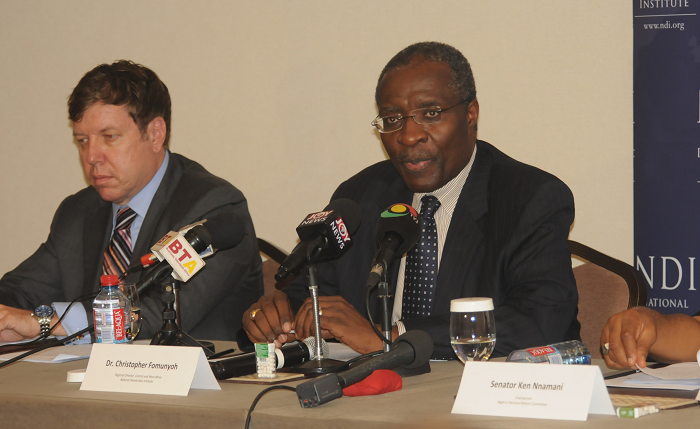The National Democratic Institute (NDI) has urged the Electoral Commission (EC) to continue to enhance transparency and confidence in the electoral process by expanding and intensifying its engagement with all stakeholders.
The institute, a non-profit, non-partisan organisation dedicated to supporting and strengthening democratic institutions around the world, also asked the EC to undertake more vigorous and direct public outreach with voters in both urban and rural areas to enhance and promote credible and peaceful elections.
Political parties, the NDI said, should reaffirm their commitment to peaceful polls as reflected in the Ada Communique of May 2016, and also reactivate the code of conduct signed in 2012 and reaffirm their commitment to credible and violence-free polls.
The NDI delegation
The NDI made the recommendations after it deployed an international delegation to the country with the purpose of assessing preparations for the 2016 presidential and parliamentary elections and also to support Ghana’s efforts at conducting credible and peaceful polls.
The delegation was composed of regional and election experts from North America and Africa, including a former President of the Nigerian Senate and current Chairman of the 2016 Nigerian Constitutional and Electoral Reform Committee, Senator Ken Nnamani; a former Chairperson of the Independent Electoral Commission (IEC) of South Africa, Dr Brigalia Bam; a Senior Associate and Regional Director for Central and West Africa at the NDI, Dr Christopher Fomunyoh; and a Senior Advisor for Elections at the NDI, Mr Richard Klein.
The delegation met with the Chairperson of the EC, Mrs Charlotte Osei, presidential candidates and political party leaders from the National Democratic Congress (NDC) and the New Patriotic Party (NPP), representatives of civic organisations, women leaders, heads of statutory bodies, journalists, security officials, elder statesmen and women, and representatives of the international community.
As part of its recommendations, the delegation urged the EC to make available to all stakeholders its communication plan for regular, structured engagement with various stakeholders and increase the frequency of such encounters as election day approached.
Women’s participation
The EC, the NDI said, should actively facilitate women’s participation as voters and promote gender balance in the recruitment and deployment of polling station officers.
“The presence of women as polling station officials or party agents can also help reduce tensions and promote peace at polling stations”, the NDI recommended.
The government, the NDI said, should ensure that the professional integrity of the security services and their plans were not compromised by political actors, while the National Commission for Civic Education (NCCE) should intensify activities to educate voters on the election process.
The NDI also called on eminent persons including religious, traditional, opinion and political leaders to work jointly and severally to amplify and disseminate anti-violence messages while urging the media, working in collaboration with civil society, to increase efforts to create platforms for candidates and inter-party debates, as well as the discussions of issues of national interest.
Role of the media
“The media should promote responsible, objective and issue-oriented election reporting and desist from disseminating misinformation, inflammatory language and hate speech. Users of social media platforms should demonstrate a greater sense of civic responsibility in their interactions,” the NDI said.
Towards that end, it urged the National Media Commission (NMC) and the Ghana Journalists Association (GJA) to promote responsible election reporting and create effective mechanisms to monitor unprofessional conduct.
The NDI noted that the 2016 polls would take place in a more challenging context than past elections, but added that if credible and peaceful, it would further consolidate democratic institutions and practices in the country.
“However, should these polls fail to meet the expectations of the people of Ghana, that would seriously undermine the democratic gains made over the past two decades and could negatively impact other countries in the sub-region,” it warned.

